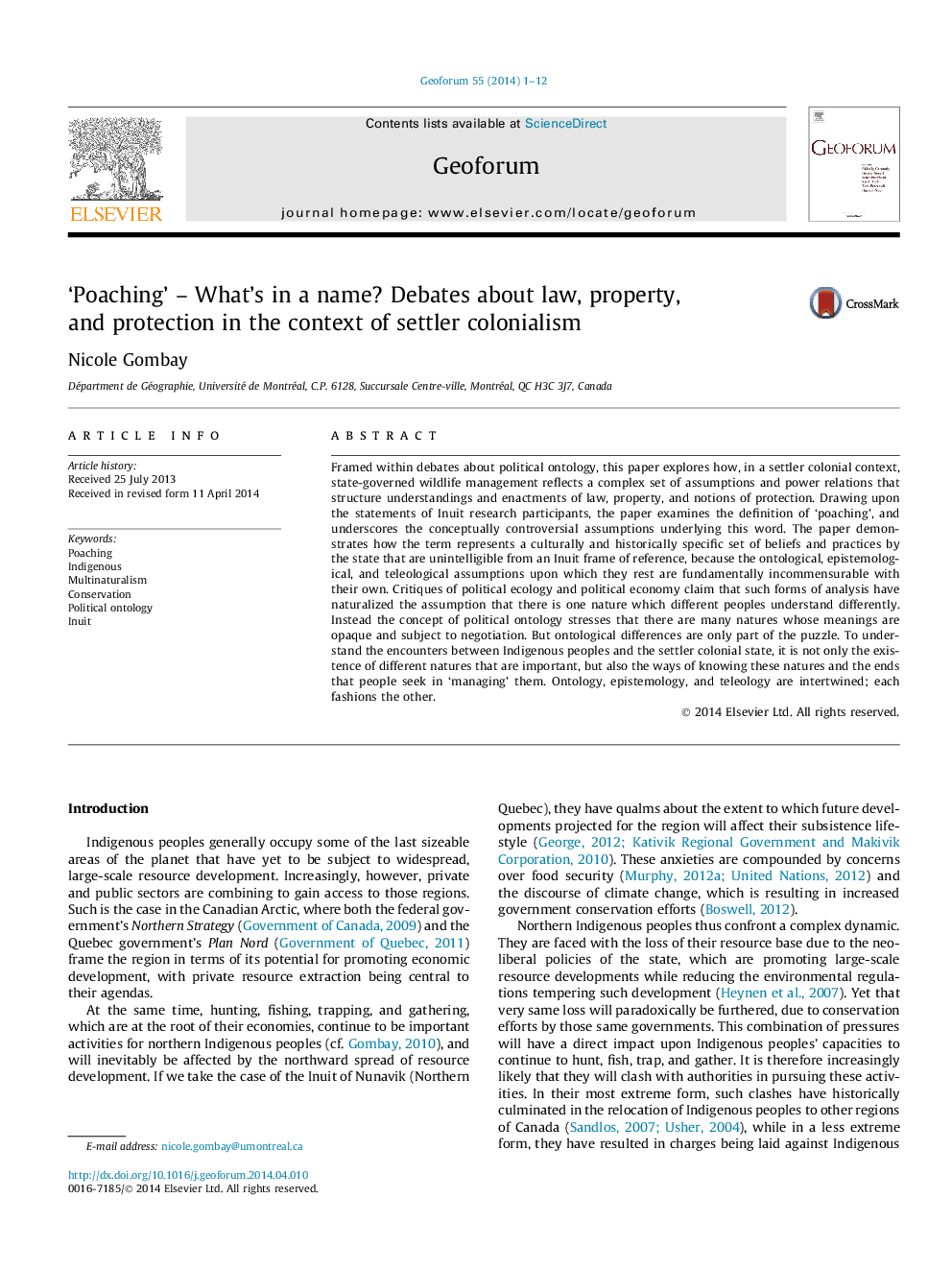| کد مقاله | کد نشریه | سال انتشار | مقاله انگلیسی | نسخه تمام متن |
|---|---|---|---|---|
| 5073871 | 1477134 | 2014 | 12 صفحه PDF | دانلود رایگان |
عنوان انگلیسی مقاله ISI
'Poaching' - What's in a name? Debates about law, property, and protection in the context of settler colonialism
ترجمه فارسی عنوان
"شکار" - چه چیزی در یک نام است؟ بحث در مورد قانون، دارایی و حفاظت در برابر استعمار سکولار
دانلود مقاله + سفارش ترجمه
دانلود مقاله ISI انگلیسی
رایگان برای ایرانیان
کلمات کلیدی
شکارچی بومی چند ملیتی، حفاظت، هستی شناسی سیاسی، اینویت،
ترجمه چکیده
این مقاله در چارچوب بحث درباره هستیشناسی سیاسی، در این مقاله بررسی می کند که چگونه در یک محیط مستعمره مستعمره، مدیریت حیات وحش با حکومت حاکم بر یک مجموعه پیچیده از مفروضات و روابط قدرت است که ساختار عقاید و قوانین قانون، اموال و مفاهیم حفاظت را تشکیل می دهد. بر اساس اظهارات شرکتکنندگان تحقیق اینوییت، این مقاله تعریف تعصب را مورد بررسی قرار می دهد و مفروضات مفهومی بحث انگیز مبنی بر این کلمه را برجسته می کند. این مقاله نشان می دهد که چگونه این اصطلاح یک مجموعه فرهنگی و تاریخی خاصی از باورها و عملکردهای دولت است که از یک مرجع درونی اینوییت ها نامفهوم هستند، زیرا مفاهیم هستی شناختی، معرفت شناختی و روان شناختی که بر پایه آنها بقیه اساسا با خودشان ناسازگار است. انتقاد از بوم شناسی سیاسی و اقتصاد سیاسی ادعا می کند که چنین اشکال تجزیه و تحلیل طبیعی این فرض را به وجود آورده است که یک طبیعت وجود دارد که مردم مختلف به طور متفاوت درک می کنند. در عوض مفهوم هستی شناسی سیاسی تأکید می کند که طبیعت بسیاری وجود دارد که معانی آنها متمایز و مورد بحث هستند. اما تفاوت های هستی شناختی تنها بخشی از پازل است. برای درک برخورد بین مردم بومی و دولت مستعمره مهاجر، نه تنها وجود طبیعت های متفاوتی که مهم هستند بلکه همچنین روش هایی برای شناختن این طبیعت و اهداف که مردم به دنبال آن هستند، "مدیریت" هستند. هستی شناسی، معرفت شناسی، و طلوع در هم آمیخته اند؛ هر مدل دیگر.
موضوعات مرتبط
علوم انسانی و اجتماعی
اقتصاد، اقتصادسنجی و امور مالی
اقتصاد و اقتصادسنجی
چکیده انگلیسی
Framed within debates about political ontology, this paper explores how, in a settler colonial context, state-governed wildlife management reflects a complex set of assumptions and power relations that structure understandings and enactments of law, property, and notions of protection. Drawing upon the statements of Inuit research participants, the paper examines the definition of 'poaching', and underscores the conceptually controversial assumptions underlying this word. The paper demonstrates how the term represents a culturally and historically specific set of beliefs and practices by the state that are unintelligible from an Inuit frame of reference, because the ontological, epistemological, and teleological assumptions upon which they rest are fundamentally incommensurable with their own. Critiques of political ecology and political economy claim that such forms of analysis have naturalized the assumption that there is one nature which different peoples understand differently. Instead the concept of political ontology stresses that there are many natures whose meanings are opaque and subject to negotiation. But ontological differences are only part of the puzzle. To understand the encounters between Indigenous peoples and the settler colonial state, it is not only the existence of different natures that are important, but also the ways of knowing these natures and the ends that people seek in 'managing' them. Ontology, epistemology, and teleology are intertwined; each fashions the other.
ناشر
Database: Elsevier - ScienceDirect (ساینس دایرکت)
Journal: Geoforum - Volume 55, August 2014, Pages 1-12
Journal: Geoforum - Volume 55, August 2014, Pages 1-12
نویسندگان
Nicole Gombay,
